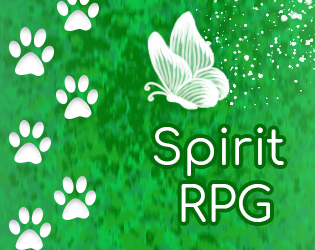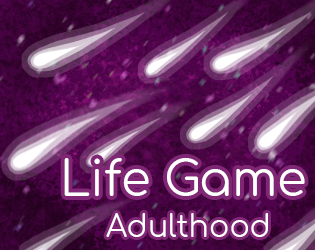
Note: We’re going to talk in depth about our thoughts while designing this game, which will likely affect your experience of it. We highly recommend playing it first if you have any inclination to do so: Spirit RPG (itch.io)
What is the game about?
Spirit RPG is an RPG Maker prototype in which you convince spirits to lend you their powers through magical encounters that mirror turn-based RPG battles, but require you reach an Accord rather than simply fight. In these encounters, your characters have moves to defend or heal themselves, convince the spirits, or otherwise modify the encounter. If you succeed, the spirit joins you, providing new abilities to be used within encounters, or to help traverse the world (by moving boulders, slowing turbulent winds or growing plants, for example).

We used RPG Maker because it seemed like the best tool to create something that felt and played like an RPG with only two of us working on it. For the first area, playable in the prototype, we focused on making sure each encounter was fun and unique, and using their powers to explore was interesting. In many ways, it is a proto-Elemental Flow: It’s an RPG, ‘encounters’ which involve reaching an accord with the other party, there are no standard levels or power escalation. In fact, in the first version of Elemental Flow, your character was an Elemental Ranger, helping animals in the wilderness! Here’s a mock-up from many years ago, before Elemental Flow settled on its current world and story.

Thoughts, Goals and Inspirations
Flo: The Spirits in this game are reminiscent of Golden Sun’s djinn – they help you in and out of combat, and have strong ties to nature – it’s a game that was formative for me, and whose design choices I want to see in more RPGs. ‘Equipping’ critters as a form of character customization is different enough to feel like its own system, and in Spirit we used different ‘slots’ to limit which powers could work together. I also really enjoyed designing the Spirits themselves!

Bucking the ‘standard’ framing devices is something else I look for in RPGs. In this game, you begin with the spirits of time and space by your side, who are a meta conceit for saving/loading your game, quick travel, and rewinding encounters. I don’t think every RPG needs to have an explanation for their Game Over screen, or for every little convenience, but I like making choices because they add to the game, rather than to match what’s ‘standard’.
My appreciation of Pokemon also seeps through, and not just in the Spirits’ design. One of your characters writes information about the Spirits you befriend in an encyclopedia reminiscent of a Pokedex. I’m the kind of person who catches ‘em all, and reads all their entries, so I took the opportunity to do the same in our game!

Since this game was made in RPG Maker, we jumped to having something comfortably playable as an RPG, even with just two people, quite quickly. As you might have seen in Teenage Years, I’m always grappling with game art – I can do enough for prototypes, and I enjoy working on UIs, but other kinds of art (especially environment art) can be taxing for me. RPG Maker allowed me to focus on making assets I enjoyed, like the Spirits themselves, and tweaking existing assets to better suit our game. Recolouring trees and flowers to match the seasons is much easier than starting from scratch! We had quickly put together a prototype (the same build you can download), sent it to a few testers, and found that they quite enjoyed it!

However, every time I open this prototype build, I’m reminded that I hadn’t worked out the game’s story by the time we made this build. There’s a vague threat to the Elven World (which presumably our elven protagonists are from), which you are hoping to stop by recruiting Spirits from the Spirit World. Your first destination is just called Hub City (all these names were still pending, as you can see), and is already outside of what you can see in the prototype. I think it was the right call to focus on getting the encounters and exploration to a place where they were fun to play, but I do wish the characters and story had a little more personality.
Des: ‘How can I make an RPG… but without combat?’ Again. There have been many attempts to mechanise having a conversation in RPGs. The likes of Last Word come to mind, or Renowned Explorers. There is value to the activity which ‘combat’ represents in an RPG, and it is largely abstract violence, so couldn’t it be abstract something else? I think the answer is definitely yes, and in many ways, not just one… but that also doesn’t make it easy to get right. In Spirit RPG, I imagined a kind of magical, verbal dance to convey feelings and intent and reach a place of harmony (an Accord) between your characters and the spirits you encounter. It wasn’t exactly cooperative, since different spirits would all have things they do, they express, which could lead to failure, but it also wasn’t just a ‘whack each other until one falls’ sort of approach. I knew from early on that I wanted the goal to be filling a bar, rather than emptying one, and we always try to make the RPG numbers as simple as possible so people can wrap their heads around them, relying on single digits where possible instead of orders of magnitude (sometimes this works, sometimes less so). Otherwise, I was happy to try to wrap normal RPG things, like ‘health’ and ‘magic’ and ‘buffs’ and resource trade-offs, into a form that fit this setup.

When I pictured the whole thing as a ‘dance’, I liked the idea that there was some resource which got passed around between the participants. This ultimately became the mana system – any ability that required mana would, instead of expending it, pass it to the targets of the ability. This opened the door for more dynamic encounters, where spirits changed what they did depending on whether you’ve passed this resource to them (or if they have passed it to you). Only the beginnings of this system appear in the prototype, and there were definitely issues displaying / teaching this idea simply, but I still think it’s interesting. Amusingly, my design brain was skipping straight to the end of the game, and we included an ‘optional super boss’ who you definitely could not defeat in the prototype, but who hinted at the possibility of returning to areas later with new abilities (though I wish we had signalled it better in hindsight).

